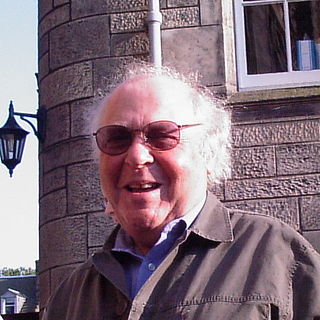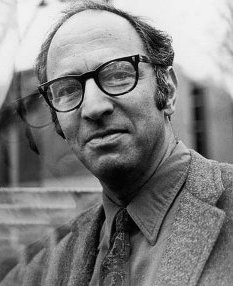Related Research Articles
Cohabitation is an arrangement where two people are not married but live together. They are often involved in a romantic or sexually intimate relationship on a long-term or permanent basis. Such arrangements have become increasingly common in Western countries since the late 20th century, being led by changing social views, especially regarding marriage, gender roles and religion.

George Ritzer is an American sociologist, professor, and author who has mainly studied globalization, metatheory, patterns of consumption, and modern/postmodern social theory. His concept of McDonaldization draws upon Max Weber's idea of rationalization through the lens of the fast food industry. He coined the term after writing The McDonaldization of Society (1993), which is among the best selling monographs in the history of American sociology.

Marshall David Sahlins was an American cultural anthropologist best known for his ethnographic work in the Pacific and for his contributions to anthropological theory. He was Charles F. Grey Distinguished Service Professor Emeritus of Anthropology and of Social Sciences at the University of Chicago.
William Julius Wilson is an American sociologist. He is a professor at Harvard University and author of works on urban sociology, race and class issues. Laureate of the National Medal of Science, he served as the 80th President of the American Sociological Association, was a member of numerous national boards and commissions. He identified the importance of neighborhood effects and demonstrated how limited employment opportunities and weakened institutional resources exacerbated poverty within American inner-city neighborhoods.

Charles Horton Cooley was an American sociologist and the son of Michigan Supreme Court Judge Thomas M. Cooley. He studied and went on to teach economics and sociology at the University of Michigan, was a founding member of the American Sociological Association in 1905 and became its eighth president in 1918. He is perhaps best known for his concept of the looking-glass self, which is the concept that a person's self grows out of society's interpersonal interactions and the perceptions of others. Cooley's health began to deteriorate in 1928. He was diagnosed with an unidentified form of cancer in March 1929 and died two months later.

Theda Skocpol is an American sociologist and political scientist, who is currently the Victor S. Thomas Professor of Government and Sociology at Harvard University. She is a highly influential figure in both sociology and political science. She is best known as an advocate of the historical-institutional and comparative approaches, as well as her "state autonomy theory". She has written widely for both popular and academic audiences. She has been President of the American Political Science Association and the Social Science History Association.
Erich Goode is an American sociologist specializing in the sociology of deviance. He has written a number of books on the field in general, as well as on specific deviant topics. He was a professor at the State University of New York at Stony Brook.
Ernest Watson Burgess was a Canadian-American urban sociologist born in Tilbury, Ontario. He was educated at Kingfisher College in Oklahoma and continued graduate studies in sociology at the University of Chicago. In 1916, he returned to the University of Chicago, as a faculty member. Burgess was hired as an urban sociologist at the University of Chicago. Burgess also served as the 24th President of the American Sociological Association (ASA).

The Michigan Population Studies Center is a demography center in the United States, with an extensive record in both domestic and international population research and training.
Stephen O. Murray was an American anthropologist, sociologist, and independent scholar based in San Francisco, California. He was known for extensive scholarly work on the sociology, anthropology, and comparative history of sexual and gender minorities, on sociolinguistics, history of the social sciences, and as an important editor and organizer of scholarly work in these areas.
Steven Ruggles is Regents Professor of History and Population Studies at the University of Minnesota, and the director of the Institute for Social Research and Data Innovation. He is best known as the creator of IPUMS, the world's largest population database. IPUMS provides information about two billion people residing in 107 countries between 1703 and the present, including every respondent to the surviving U.S. censuses of 1790 to 1940. He served as founding director of the Minnesota Population Center from 2000 to 2016. He served as the 2015 President of the Population Association of America, the first historian to hold the position. He also served as president of the Association of Population Centers (2017–2018) and president of the Social Science History Association (2018–2019). He has been active on many national advisory and study committees, including the Census Bureau Scientific Advisory Committee; the National Science Foundation Social, Behavioral, and Economic Sciences Advisory Committee; the National Science Foundation Advisory Committee for CyberInfrastructure; and the National Academy of Sciences Board on Research Data and Information.
Jerry A. Jacobs is an American sociologist noted for his work on women, work, and family. He is professor of sociology at the University of Pennsylvania, where he has taught since earning his Ph.D. in sociology at Harvard in 1983.[a] His webpage includes links to many of his published articles as well as an essay on growing up at his parents' hotel in the Catskill Mountains.

Thomas Samuel Kuhn was an American philosopher of science whose 1962 book The Structure of Scientific Revolutions was influential in both academic and popular circles, introducing the term paradigm shift, which has since become an English-language idiom.

William Bradford Wilcox is an American sociologist. He serves as Director of the National Marriage Project and Professor of Sociology at the University of Virginia, Senior Fellow at the Institute for Family Studies, and a Visiting Scholar at the American Enterprise Institute.
Rubén G. Rumbaut is a prominent Cuban-American sociologist and a leading expert on immigration and refugee resettlement in the United States. He is Distinguished Professor of Sociology at the University of California, Irvine.
Yu Xie is a Chinese-American sociologist and the Bert G. Kerstetter '66 University Professor of Sociology and the Princeton Institute for International and Regional Studies at Princeton University, where he is also the Director of the Paul and Marcia Wythes Center on Contemporary China. Xie has made contributions to quantitative methodology, social stratification, demography, Chinese studies, sociology of science, and social science data collection. He was Otis Dudley Duncan Distinguished University Professor of Sociology, Statistics, and Public Policy at the University of Michigan. He is a member of the American Academy of Arts and Sciences, Academia Sinica, and the National Academy of Sciences.
Pamela Jane Smock is an American sociologist and demographer. She is a research professor in the University of Michigan's Population Studies Center, of which she was the director from 2010 to 2013. She is also a professor of sociology and women's studies at the University of Michigan. She is known for her research on issues related to the family, such as cohabitation, which she has been studying for over two decades.
Susan Cotts Watkins is an American demographer. She has been a professor at Yale University and the University of Pennsylvania. She is now professor emerita at the University of Pennsylvania. Her research has focused on the impact of social networks on cultural change in the demography of the U.S., Western Europe, and Africa.
Cecilia Menjívar, born and raised in El Salvador, is an American sociologist who has made significant contributions to the study of international migration, the structural roots of inequalities, state power, gender-based violence against women, and legal regimes. Menjívar is currently a Professor of sociology at the University of California, Los Angeles where she is the Dorothy L. Meier Social Equities Chair.

Donna LaVonne Franklin is an African-American social scientist and author, and a nationally recognized scholar on African American families.
References
- Church News, May 25, 1996[ full citation needed ]